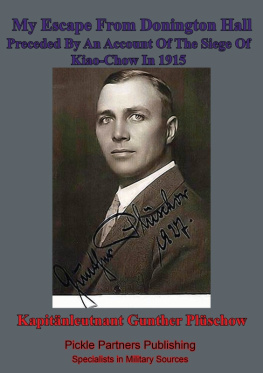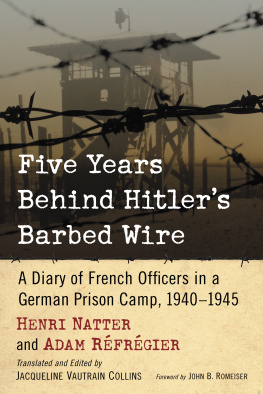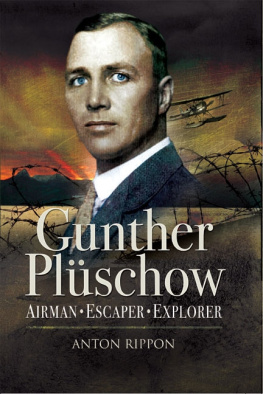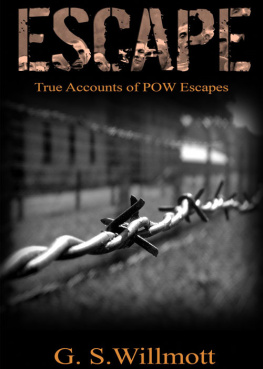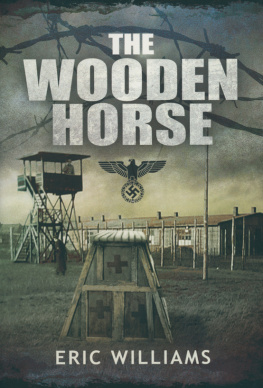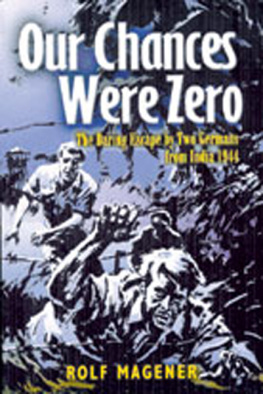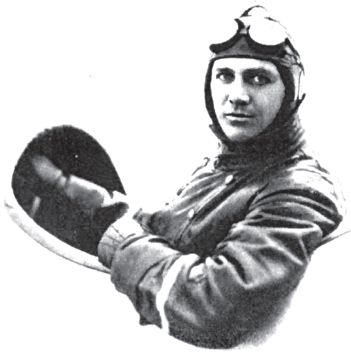
Kapitnleutnant Gunther Plschow

First published in Great Britain in 2015 by
Pen & Sword Military
an imprint of
Pen & Sword Books Ltd
47 Church Street
Barnsley
South Yorkshire
S70 2AS
Copyright Gunther Plschow 2015
ISBN 978 1 47382 705 9
eISBN 9781473855267
The right of Gunther Plschow to be identified as the Author of this Work has been asserted by him in accordance with the Copyright, Designs and Patents Act 1988.
A CIP catalogue record for this book is available from the British Library
All rights reserved. No part of this book may be reproduced or transmitted in any form or by any means, electronic or mechanical including photocopying, recording or by any information storage and retrieval system, without permission from the Publisher in writing.
Pen & Sword Books Ltd incorporates the imprints of Pen & Sword Archaeology, Atlas, Aviation, Battleground, Discovery, Family History, History, Maritime, Military, Naval, Politics, Railways, Select, Transport, True Crime, and Fiction, Frontline Books, Leo Cooper, Praetorian Press, Seaforth Publishing and Wharncliffe.
For a complete list of Pen & Sword titles please contact
PEN & SWORD BOOKS LIMITED
47 Church Street, Barnsley, South Yorkshire, S70 2AS, England
E-mail: enquiries@pen-and-sword.co.uk
Website: www.pen-and-sword.co.uk
Contents
List Of Illustrations
Introduction
G unther Plschow (18861931) has the unique distinction of being the only German serviceman to escape from a Prisoner of War camp in the British Isles and make a home run to Germany in either of the two world wars; indeed, only one other (Franz von Werra) managed to do so from any Prisoner of War camp, which he achieved in the Second World War from Canada via the USA and Mexico.
Plschow lived an extraordinary life, culminating in his death as the result of an air crash in the Argentine part of Patagonia at the age of forty-four.
He was serving in the Imperial German Navy as a recently commissioned flyer at the outbreak of the war and was based in the German enclave in China of Tsingtau (modern Qindao). A little over a third of the book is taken up with a description of his exploits there, the attempts to keep his aircraft airworthy (it was the only one the defenders had) and the story of the defence of this German outpost against Japanese Imperial forces, which continued into November 1914. This part of the book alone makes it highly unusual, as first-hand accounts of these German outposts of empire in the war are few and far between. He was ordered to fly out of the enclave before it fell and get back to Germany as best he could; this he almost achieved (crashing his aircraft in the process).
He had various adventures in China and managed to make his way, armed with papers in Shanghai that identified him as Swiss, to the west coast of the USA and from there to New York. The next stage was to get to Italy (at this time still neutral), but he was identified in Gibraltar and thus the first stage of his bid to return to the Fatherland had resulted in failure.
He was imprisoned in the fairly relaxed camp regime of Donington Hall, in Leicestershire, in May 1915. He escaped on 4 July and after some time in London, he foiled attempts to board shipping heading for neutral ports often spending nights hiding in the British Museum he managed to get on a ferry, the SS Prinses Juliana , heading for the Netherlands. On 12 July he was in Germany though at first no one believed his story and he was suspected of being a spy. He met the Emperor shortly afterwards and was awarded the Iron Cross First Class and was promoted.
A convinced monarchist, he felt very uncomfortable in post-war Germany and engaged in a number of failed attempts to set up a business. He began his new career of aviation explorer in South America via working on a merchant ship, leaving behind for long periods of time his extraordinarily supportive wife, Isot whom he married in 1916 and his young son, Guntolf (who in later life took his fathers Christian name).
Discovering the wonders of photography and able to finance himself by writing, he was able to return to his first love and take once more to the skies in a flying boat, becoming a pioneer in aerial photography. It was whilst engaged in this in January 1931 that he crashed near El Calafate, just inside the Argentinian border, and he and his companion, Ernst Dreblow, were killed. His remains were cremated and returned to Germany, to be joined by those of Isot in 1979.
Fortunately there is a recent biography of Plschow: Gunther Plschow: Airman, Escaper, Explorer , by Anton Rippon (Pen & Sword Books, 2009).
Escape from Donington Hall is not a literary masterpiece by any means; but it is a real boys own story and the reader gets a clear picture of the mentality of an intensely patriotic German officer. The language and the manner in which the patriotism is expressed are, of course, of the time. Direct comparisons can be made with British officers in a similar situation, such as that portrayed in I Escaped , the memoir of Jocelyn Hardy, an officer in the Connaught Rangers, captured in August 1914, which recounts his numerous escapes from German Prisoner of War camps (also published by Pen & Sword, 2014).
Nigel Cave
Chapter One
The Joys and Sorrows of a Flying-Man
I t was in the month of August of the year 1913 when I arrived in my native town, Schwerin. I had stayed several weeks in England, where I had devoted days to the visit of museums and the beautiful art collections, as well as to excursions in the vicinity of the capital. At that time I did not foresee how useful the latter would prove to me two years hence.
During the whole journey I was labouring under an inner excitement and disquiet which I could not throw off, and when I arrived in Schwerin one question only burned on my lips, and yet I did not dare put it to my uncle who fetched me from the station. For the new Naval List of autumn promotions and appointments might be issued any day, and I was on the tiptoe of expectation as to whether the wish I had cherished for years was at last to be gratified.
My uncles question: Do you know where theyve put you? gave me an electric shock.
No.
Well, then, hearty congratulations Naval Flying Corps!
I was so overjoyed that I would like to have turned a somersault in the middle of the street, but I refrained from fear of upsetting my fellow-citizens.
So I had got my wish after all!
The last days of my leave passed in a flash, and I gaily returned to the Naval College in order to complete my course of a year and a half as Inspecting Officer; but I never packed my trunks with greater pleasure than when bound for my new destination.
Just a few days before my departure one of my brother officers called out to me: I say, have you heard the latest news where youre off to?
Yes; Flying Corps.
Good Lord, man! You dont know your own luck why, youre off to Kiao-Chow.
I was speechless, and probably looked as stupid as I felt.
Yes; Kiao-Chow! And in the Flying Corps! You lucky devil to be the First Naval Flying Officer at Kiao-Chow!
It is hardly surprising that I refused to believe this until I received the official confirmation. But it was true. I had tremendous luck!
I had to wait three months longer at Kiel; but at last, on the 1st of January 1914, I found myself in my beloved Berlin. But there was no holding me; I was at Johannisthal on the 2nd of January already, and thought I could start flying on the spot. My experience, however, was that of the majority of flying-pupils. I learnt for the first time the time honoured principle of flight: Keep cool; who wants to fly must above all things learn to wait.
Next page


